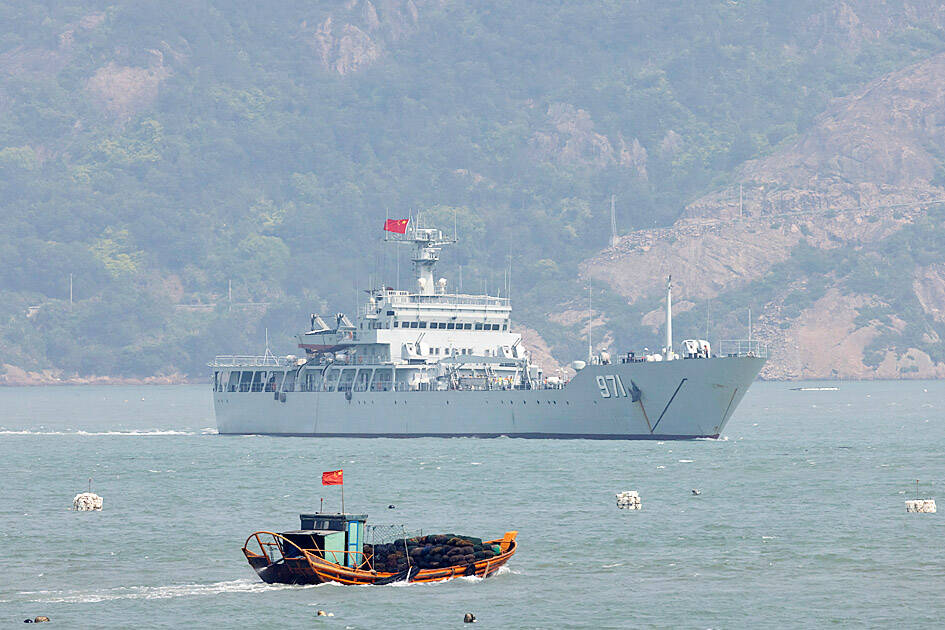China is sending balloons over Taiwan as a warning against the presidential election result and in an effort to weaken the nation’s sovereignty, US daily The Hill reported on Monday.
Frequently sending balloons over Taiwan is part of China’s increasing effort to “coerce and intimidate” the nation after voters “flouted Beijing’s warning” about Vice President William Lai (賴清德), who won the presidential election on Jan. 13, the paper said.
Chinese spy balloons flew into Taiwanese airspace almost daily before and after the election, it said.

Photo: Reuters
Beijing’s actions are a “signal about increased surveillance,” but tensions are unlikely to further escalate, it quoted Kristen Gunness, a senior policy researcher at the RAND Corporation, as saying.
“Balloons are a big deal, but it’s not enough of one to be able to — especially if Taiwan isn’t doing anything about it — to provoke a conflict or crisis,” she said.
Beijing is facing an ailing economy at home and would like to avoid stoking tensions with Washington, which might stop it from taking aggressive actions “this year or in the immediate future” unless it is provoked by events such as Taiwan declaring independence, she said.
However, China would continue “what it’s been doing, which is basically conduct air and maritime operations around Taiwan to show that they can control the maritime and airspace,” she said.
Other experts expressed graver concerns over the possibility that Beijing might launch military actions against Taiwan, the paper said, citing US Indo-Pacific Commander Admiral John Aquilino, who predicted that China would step up its aggressive behavior after the election.
The Chinese spy balloons are used globally, but they “are unlikely to be practically useful for surveillance” in Taiwan, where China already has eyes and ears, it said.
Hung Ho-fung (孔誥烽), a political economy professor and East Asia expert at Johns Hopkins University, said the balloons are “part of a Chinese tactic to diminish Taiwanese independence.”
Beijing aims to “squeeze the airspace and then blur the line” between two sides across the Taiwan Strait “as much as possible to establish a kind of status quo” where no clear boundary exists, the article quoted him as saying.
The article also quoted an analysis released on Thursday by US-based think tank the Institute for the Study of War, which said that China is attempting to “normalize using balloons in tandem with other aerial and naval” air defense identification zone incursions “to wear down Taiwan’s threat awareness.”
Sending balloons is unlikely to push the US or Taiwan to any action, it said.
Colonel Wang Chia-chun (王家駿), deputy head of the Ministry of National Defense’s joint operations planning section, earlier this month said that the military would not shoot down the balloons, as it would be a waste of ammunition and give Beijing the reaction it wants.

Taiwan has received more than US$70 million in royalties as of the end of last year from developing the F-16V jet as countries worldwide purchase or upgrade to this popular model, government and military officials said on Saturday. Taiwan funded the development of the F-16V jet and ended up the sole investor as other countries withdrew from the program. Now the F-16V is increasingly popular and countries must pay Taiwan a percentage in royalties when they purchase new F-16V aircraft or upgrade older F-16 models. The next five years are expected to be the peak for these royalties, with Taiwan potentially earning

STAY IN YOUR LANE: As the US and Israel attack Iran, the ministry has warned China not to overstep by including Taiwanese citizens in its evacuation orders The Ministry of Foreign Affairs (MOFA) yesterday rebuked a statement by China’s embassy in Israel that it would evacuate Taiwanese holders of Chinese travel documents from Israel amid the latter’s escalating conflict with Iran. Tensions have risen across the Middle East in the wake of US and Israeli airstrikes on Iran beginning Saturday. China subsequently issued an evacuation notice for its citizens. In a news release, the Chinese embassy in Israel said holders of “Taiwan compatriot permits (台胞證)” issued to Taiwanese nationals by Chinese authorities for travel to China — could register for evacuation to Egypt. In Taipei, the ministry yesterday said Taiwan

‘LIKE-MINDED PARTNER’: Tako van Popta said it would be inappropriate to delay signing the deal with Taiwan because of China, adding he would promote the issue Canadian senators have stressed Taiwan’s importance for international trade and expressed enthusiasm for ensuring the Taiwan-Canada trade cooperation framework agreement is implemented this year. Representative to Canada Harry Tseng (曾厚仁) in an interview with the Central News Agency (CNA) said he was increasingly uneasy about Ottawa’s delays in signing the agreement, especially as Ottawa has warmed toward Beijing. There are “no negotiations left. Not only [is it] initialed, we have three versions of the text ready: English, French and Mandarin,” Tseng said. “That tells you how close we are to the final signature.” Tseng said that he hoped Canadian Prime Minister Mark Carney

POSITIVE DEVELOPMENT: Japan and the US are expected to hold in-depth discussions on Taiwan-related issues during the meeting next month, Japanese sources said The holding of a Japan-US leaders’ meeting ahead of US President Donald Trump’s visit to China is positive news for Taiwan, former Japan-Taiwan Exchange Association representative Hiroyasu Izumi said yesterday. After the Liberal Democratic Party’s landslide victory in Japan’s House of Representatives election, Japanese Prime Minister Sanae Takaichi is scheduled to visit the US next month, where she is to meet with Trump ahead of the US president’s planned visit to China from March 31 to April 2 for a meeting with Chinese President Xi Jinping (習近平). Japan and the US are expected to hold in-depth discussions on Taiwan-related issues during the